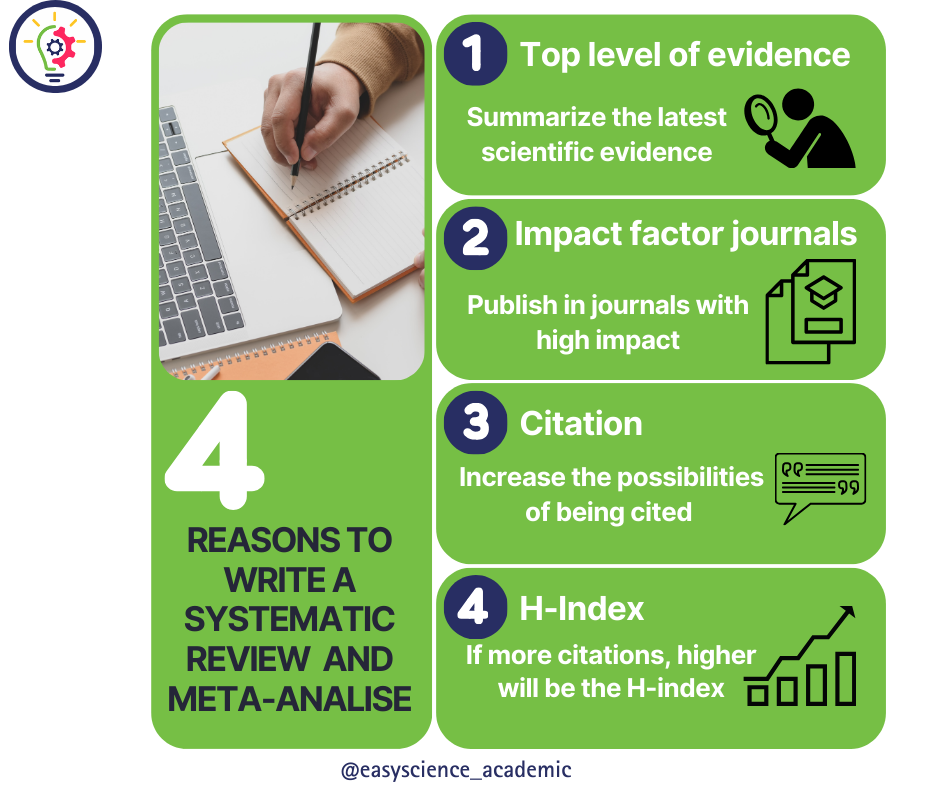Systematic reviews are more than just a thorough analysis of existing literature; they are a cornerstone of evidence-based research and a powerful tool for advancing your academic and scientific career at every stage. For PhD students, writing a systematic review is an essential exercise that deepens their understanding of their research topic, allowing them to identify key trends, gaps, and emerging questions that their work can address. For early-career researchers, a systematic review is a strategic way to build a strong academic foundation, leading to high-impact publications and increased citations that can accelerate career growth. Even for senior researchers, conducting systematic reviews is crucial for staying at the forefront of their field, ensuring they remain influential and relevant in a rapidly evolving research landscape. If you’re considering where to invest your time and efforts in research, here are four compelling reasons why writing a systematic review should be at the top of your list.
1. Highest Level of Evidence
In the hierarchy of research evidence, systematic reviews are considered the pinnacle. Unlike narrative reviews or expert opinions, systematic reviews follow a structured and transparent methodology to gather, assess, and synthesize data from multiple studies on a specific topic. This process involves defining a clear research question, using comprehensive search strategies to find relevant studies, and applying rigorous criteria to assess their quality. By integrating data from a variety of sources, systematic reviews reduce the risk of bias and provide a more accurate and reliable overview of the evidence available. This makes them invaluable for informing clinical guidelines, public health policies, and practice recommendations across various fields, from medicine to social sciences.
2. Publication in High-Impact Journals
Getting published in high-impact factor journals is a significant milestone in any researcher’s career, and systematic reviews are highly sought after by these journals. These publications are known for their stringent peer-review processes and their focus on innovative, high-quality research. Systematic reviews meet these criteria because they offer a detailed and methodologically sound synthesis of existing knowledge, often identifying trends, gaps, and future directions in the research landscape. Moreover, because they serve as a comprehensive reference on a particular subject, systematic reviews are likely to attract a wide readership, further enhancing their appeal to prestigious journals. Successfully publishing in such journals not only increases the visibility of your work but also elevates your academic profile, opening doors to future research opportunities and collaborations.
3. Boost in Citations
One of the key metrics of a researcher’s impact is the citation count, and systematic reviews tend to be highly cited. This is because systematic reviews provide a one-stop source of information that summarizes the best available evidence on a particular topic. Researchers often use these reviews to quickly get up to speed on a subject, to identify gaps in the literature, or to find references that support their hypotheses. Moreover, because systematic reviews are frequently used as the basis for further research, including meta-analyses or clinical guidelines, they often become highly influential in their fields. Over time, as more researchers cite your review, your citation count will grow, contributing to your reputation as an authority on the topic.
4. Increase in H-Index
The H-index is a metric that reflects both the number of publications and the number of citations per publication, serving as an indicator of a researcher’s influence and relevance in their field. A systematic review, by its nature, has the potential to significantly increase your H-index. As your review accumulates citations, it not only boosts your overall citation count but also enhances your H-index, especially if it becomes a foundational reference in its field. A higher H-index is not just a number; it reflects your impact on your research community and can play a crucial role in career advancements, such as securing tenure, obtaining research grants, or being invited to speak at conferences. In this way, writing a systematic review can have a long-lasting impact on your academic and professional trajectory, making it a strategic investment in your future.
Conclusion
Writing a systematic review is more than just a scholarly exercise; it’s a strategic move to strengthen your research career. From providing the highest level of evidence to boosting your publication prospects, citations, and H-index, the benefits are substantial. Systematic reviews help you contribute meaningfully to your field, positioning you as a key player in shaping future research and practice.
In a landscape where academic and scientific contributions are increasingly scrutinized for quality and impact, investing time in a systematic review can provide you with a solid foundation for long-term success. Whether you’re aiming to influence clinical guidelines, secure high-profile publications, or simply increase your academic visibility, a systematic review is an essential tool that promises considerable returns.







